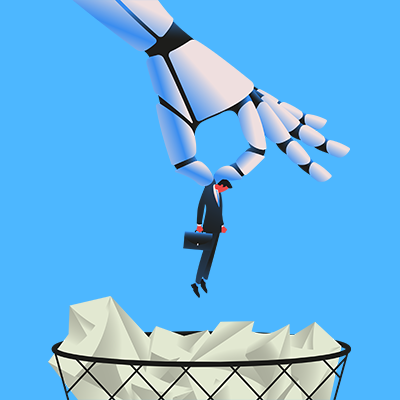No matter where you turn lately, it seems like everyone is talking about generative AI – the catchall term for tech that enables users to produce original text, images, and other content that is comparable to human creations. What started with OpenAI’s release of ChatGPT in 2022 has now become part of the generative AI programs that a growing number of businesses are adopting.
And ChatGPT and other AI programs are starting to gain traction in the HR field too. According to our recent Generative AI in the Workplace survey, 12% of HR professionals are currently using AI to complete HR functions, while 13% have plans to do so. This is in large part to generative AI’s potential to help HR cut down on costs and improve workplace productivity.
But for all generative AI’s opportunities, concerns remain about whether AI will displace jobs entirely.
What does this mean for HR professionals? Will AI enhance HR or erase it?
The short answer is no. While a Gartner report indicated that AI could replace millions of jobs in the next few years, it also noted that AI would create 2.3 million additional jobs. 1 This is significantly more than the 1.8 that Gartner predicts will be eliminated.
Similarly, generative AI may help to automate certain day-to-day HR tasks but there are still many HR duties AI can’t replace. In fact, when used correctly, generative AI can help transform the HR role, allowing HR teams to be far more productive, responsive and efficient. Here are just a few emerging ways HR can harness AI-powered tools.
- Content Creation: Generative AI tools, like ChatGPT, can be trained to write effective job descriptions to attract the right candidates. According to our HR survey, it’s one of the main reasons HR professionals are using AI right now. HR professionals are also partnering with AI to write policies. This could potentially save time for HR professionals so, it’s no surprise that 54% of respondents, who are self-employed, were twice as likely than any other group to use or plan to use generative AI for this purpose.
- Automation of Repetitive HR Tasks: With generative AI, HR can offload smaller, time-intensive tasks to concentrate on more complex assignments. In fact, 56% of HR professionals, who are using generative AI, are already having AI automate mundane processes, according to the latest HPRA pulse survey. For example, AI can be used to automate responses to employee questions — “How many days off am I entitled to?” — or requests such as changing a payroll password. It can be trained to populate FAQ documents or HR can use it to auto-create workforce schedules that align with employee preferences and availability.
- Recruitment: Most HR departments have to handle high volumes of resumes for every job posting. Intelligent AI software, however, can be programmed to learn from your hiring history, role requirements and existing resume data to sift through applications and identify candidates who meet the selection criteria.
Chatbots then can be used to conduct an initial interview of candidates in the form of prerecorded questions, gathering information about skills, training and employment history. These automations can give HR professionals more time to prioritize the most qualified candidates to ensure that they are creating an exceptional candidate experience.
AI can also be used to reach passive candidates to fill openings. AI can scan different channels to automatically give you access to a list of candidates to preview that can be used to pinpoint the best candidate for the job. - Employee Engagement: AI provides opportunities to better understand what promotes employee engagement in real-time. For example, there are AI chatbots that could ask employee questions every few weeks. These anonymized and aggregated responses could then be recorded and analyzed for insights. AI could help HR spend more time evaluating the data and developing a plan of action based on the findings, which can aid in improving the employee experience and overall company climate.
- Some Other AI Uses: HR teams are also using AI to collect accurate salary range and benefits information to create more fair compensation packages. Onboarding, learning and development, employee monitoring and internal mobility processes are some other ways HR is employing AI.
Potential Pitfalls
AI promises to be a game-changer for HR departments, streamlining processes so that HR can perform more efficiently. But it should be noted that there are risks associated with AI.
Bias and discrimination: For example, if an algorithm is programed for job descriptions that contain certain gender-based descriptors, it could favour male candidates for particular roles.
Missing human insight: When it comes to screening applications, AI also can’t really take into account non-quantifiable factors like cultural fit, which is an important indicator for long-term success in a role. Or the algorithm may reject applications with work gaps that represent major life events that include pregnancy, illness etc. HR will be needed to dive deep into the data and make more nuanced hiring decisions.
Privacy & cybersecurity concerns: According to the HRPA pulse survey, 31% of respondents were hesitant to implement AI due to data and privacy concerns. Data privacy policies and guidelines will be key to protect employee data and to ensure AI is used ethically and responsibly.
Tech issues including plagiarism and lack of originality could be other possible AI limitations. AI could also be susceptible to hacking which can lead to grave consequences for organizations.
Bottom line: AI in the workplace has the power to radically revolutionize HR for the better. Learning more about AI and strategizing on how you and your workplace can integrate these applications can help HR achieve its objectives now and for the future.
Check out the full Generative AI in the Workplace pulse survey report.

